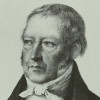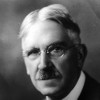“ On the one hand, the outer world presents the material or content of knowledge through passively received sensations. On the other hand, the mind has certain ready powers, attention, observation, retention, comparison, abstraction, compounding, etc. ”
John Dewey, Democracy and Education (1916). copy citation
| Author | John Dewey |
|---|---|
| Source | Democracy and Education |
| Topic | comparison observation |
| Date | 1916 |
| Language | English |
| Reference | |
| Note | |
| Weblink | http://www.gutenberg.org/files/852/852-h/852-h.htm |
Context
“The forms of powers in question are such things as the faculties of perceiving, retaining, recalling, associating, attending, willing, feeling, imagining, thinking, etc., which are then shaped by exercise upon material presented. In its classic form, this theory was expressed by Locke. On the one hand, the outer world presents the material or content of knowledge through passively received sensations. On the other hand, the mind has certain ready powers, attention, observation, retention, comparison, abstraction, compounding, etc. Knowledge results if the mind discriminates and combines things as they are united and divided in nature itself. But the important thing for education is the exercise or practice of the faculties of the mind till they become thoroughly established habitudes.”
source



